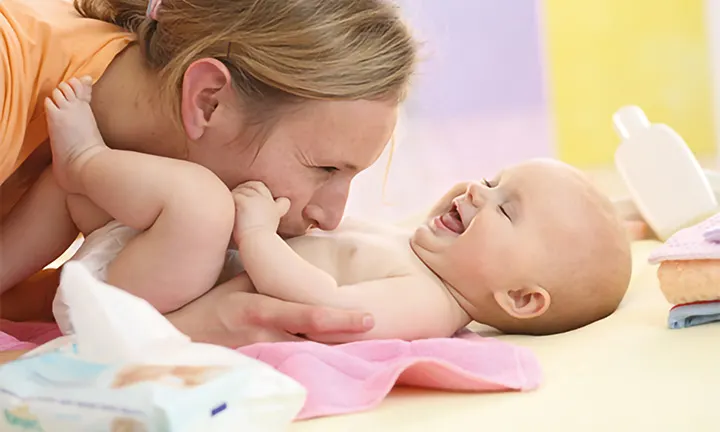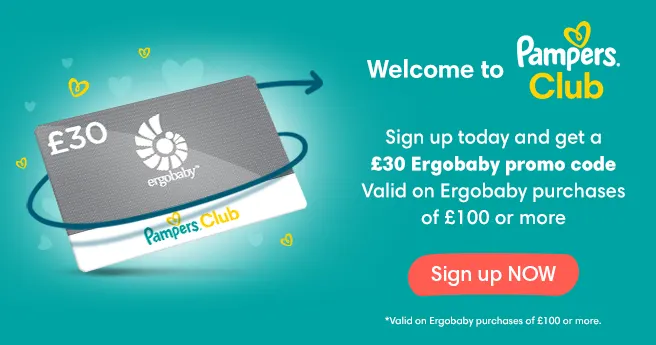Baby Skin Care
Is anything more perfect than your baby's skin? You can't help but touch and caress it. Your baby loves it as much as you do.
Protecting delicate skin from harm is an important job for a parent. Here's what you'll need to know and do.
The Soft Touch
While your baby's skin is famously soft and smooth, it is also strong and resilient. The skin is the body's largest organ – a group of cells stacked together to form a thin but tough barrier. Skin constantly renews itself throughout life, and the renewal process begins even before birth.
Still, many a newborn's skin is anything but perfect at first. You should not be alarmed by considerable peeling, redness or flaking in the first few days after birth, especially around the wrists, knees and feet. This is all normal.
Over the first few weeks, your baby's skin will fill out and get smoother.
Moisturisers
To keep your baby's skin healthy, you need to maintain its natural softness and strength. Even if your baby's skin isn't peeling, it may benefit from using moisturisers.
You can get fragrance-free products with ingredients such as mineral oil or petroleum. If you need a recommendation you can speak to your healthcare provider.
Whatever you choose, stick with it so your baby's skin won't have to adjust to the different blends of ingredients in various products.
Infant sun protection
Babies of all ages should stay out of direct sunlight. A baby can get sunburnt in as little as 10 to 15 minutes, even on cloudy days.
The first thing you can do to minimise exposure is clothing. Sun protective clothing rated UPF 50 is best.
On warm days, dress your baby in lightweight cotton clothing that covers her arms and legs
Make sure that she wears a wide-brimmed hat for every outing
Try to avoid going out when the sun's rays are strongest, between 10 am and 3 pm.
When outside, try to keep your baby in the shade.
It is best not to rely on sunscreen as a substitute for protective clothing or sun avoidance. Use it to cover your baby's exposed face, hands and feet.
Baby Nail Care – protect the skin from scratches
Your baby's tiny fingernails are very thin and sharp and grow surprisingly fast! You may need to trim them as often as twice a week.
This is important since newborns can scratch their faces with their own nails.
Nail care tips
Use a soft emery board, baby nail clippers or baby nail scissors for trimming. (This may be easier when your baby is asleep)
To avoid snipping the fingertip skin as you trim the nail, hold her finger firmly and press the finger pad away from the nail as you cut.
Toenails grow much more slowly and are usually very soft. They don't need to be kept as short as fingernails – a trim once or twice a month is enough.
While her toenails may appear to be ingrown, but babies seldom suffer from this.
Call your healthcare provider if the skin around the toenails gets red, inflamed or hard.
Penis skin care
Circumcision:
Caring for your newborn son's circumcision isn't difficult if you know what to do. For the first week after the procedure, the penis may look quite red and develop a yellow scab.
Post-circumcision tips
Keep the area clean using mild soap and water after each nappy change.
Coat the head of the penis with petroleum jelly to protect it, and cover it gently with a gauze dressing.
Your healthcare provider will tell you how long to keep the dressing on. If you suspect an infection at any time, notify your provider.
If your son is not circumcised
Bathe his penis with a mild soap and water just like the rest of the nappy area. Don't try to pull back the foreskin – it will gradually retract on its own, usually by his third birthday.
Baby Laundry Tips
Washing Powder:
Your baby's skin may be sensitive to chemicals in new clothing and to soap and detergent left on clothes after washing.
Wash all new clothes and linens before your baby uses them.
For the first few months, do your infant's wash separately from your other washing.
Use a gentle detergent and a thorough rinse cycle.
Baby skin is delicate and requires special attention, these tips will help ensure that it stays protected.
Read more about Newborn Baby
Join Pampers Club and get:




